Google is testing a series of experimental AI-powered features that could change how people interact with search and digital discovery.
Tools like Doppl, Food Mood, Talking Tours, and Learn About are not yet mainstream, but they give us a glimpse into where Google may be heading. Each experiment highlights a distinct way AI can influence consumer experiences, ranging from shopping and travel to food and education.
For business leaders, the importance lies in how these features could influence visibility, customer engagement, and competitive positioning if they are developed further.
Having these on your radar now can avoid sharp surprises and knee-jerk tactical pivots later down the line.
Doppl
Doppl is a new experimental app from Google Labs that lets users try on different looks and explore their personal style. It blends fashion discovery with AI-driven recommendations, acting like a personal stylist in app (on both Android and App Store).
This was initially talked about on the Google blog in 2024 and referred to as Virtual Try-On (VTO).
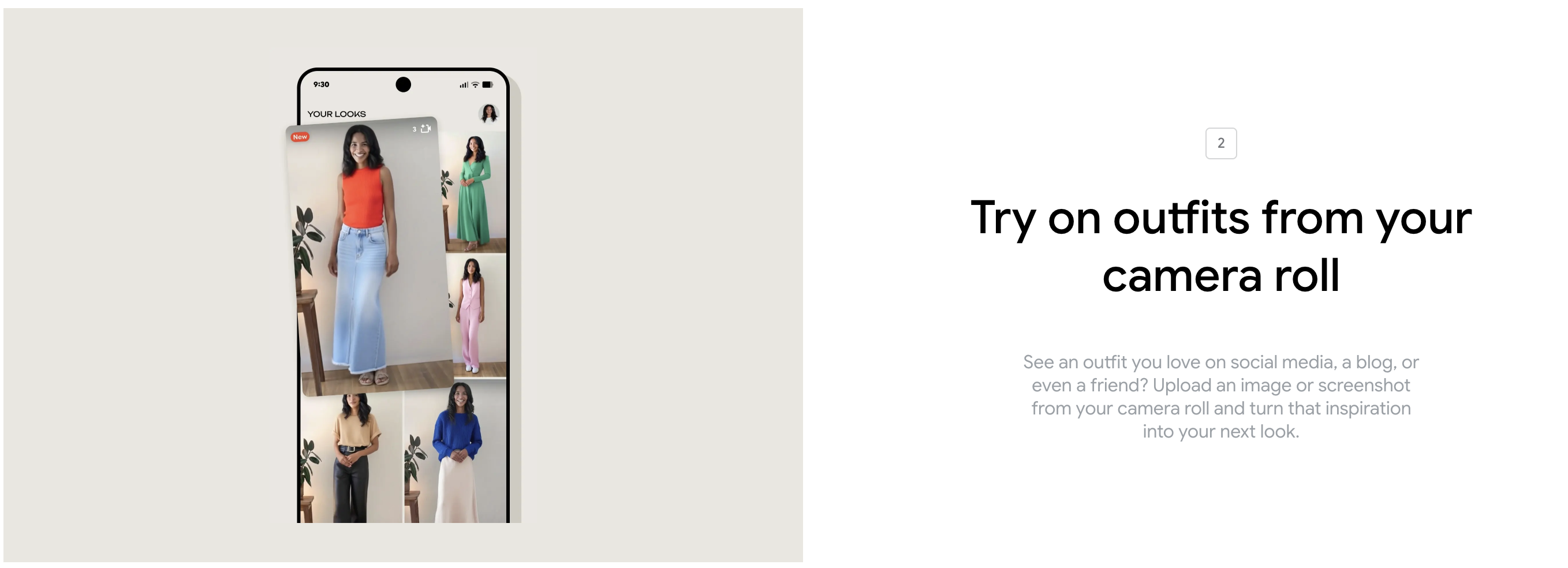 Screenshot from labs.google/doppl, September 2025
Screenshot from labs.google/doppl, September 2025Given the adoption statistics Google has claimed around Google Lens and Circle to Search, Doppl could further change how consumers might approach online fashion and homeware buying.
Instead of browsing catalogs or searching by product type, users can explore outfits in a more playful, visual, and interactive way. This creates opportunities for fashion brands that invest in rich product imagery and metadata, while also introducing risks for those that fail to prepare.
It also highlights that outfit imagery doesn’t need to be professional; users can use Doppl to visualize outfits from their friends’ photos, branded Instagram posts, or what you include in your blogs and style guides.
For ecommerce websites, Doppl could reduce the importance of traditional product listings and increase the value of enriched product data. Style-driven discovery may also accelerate purchase decisions, compressing the sales cycle from browsing to checkout.
For example, a fashion retailer that provides detailed imagery, size data, and styling suggestions may see its outfits recommended more often when users test new looks in Doppl. A competitor with limited product data and imagery could be excluded from the experience entirely.
The takeaway for leaders here is that Doppl illustrates how AI may reshape online shopping into an interactive discovery experience. Fashion and lifestyle retailers should prioritize high-quality product data and imagery to remain competitive.
Food Mood
Food Mood is a recipe generator that combines ingredients and cooking styles to provide creative inspiration for meals.
Instead of entering exact recipes, users can describe their mood or inspiration and receive unique fusion-style ideas.
If rolled out and expanded, this could shift recipe discovery from rigid keyword searches to open-ended, experience-based prompts.
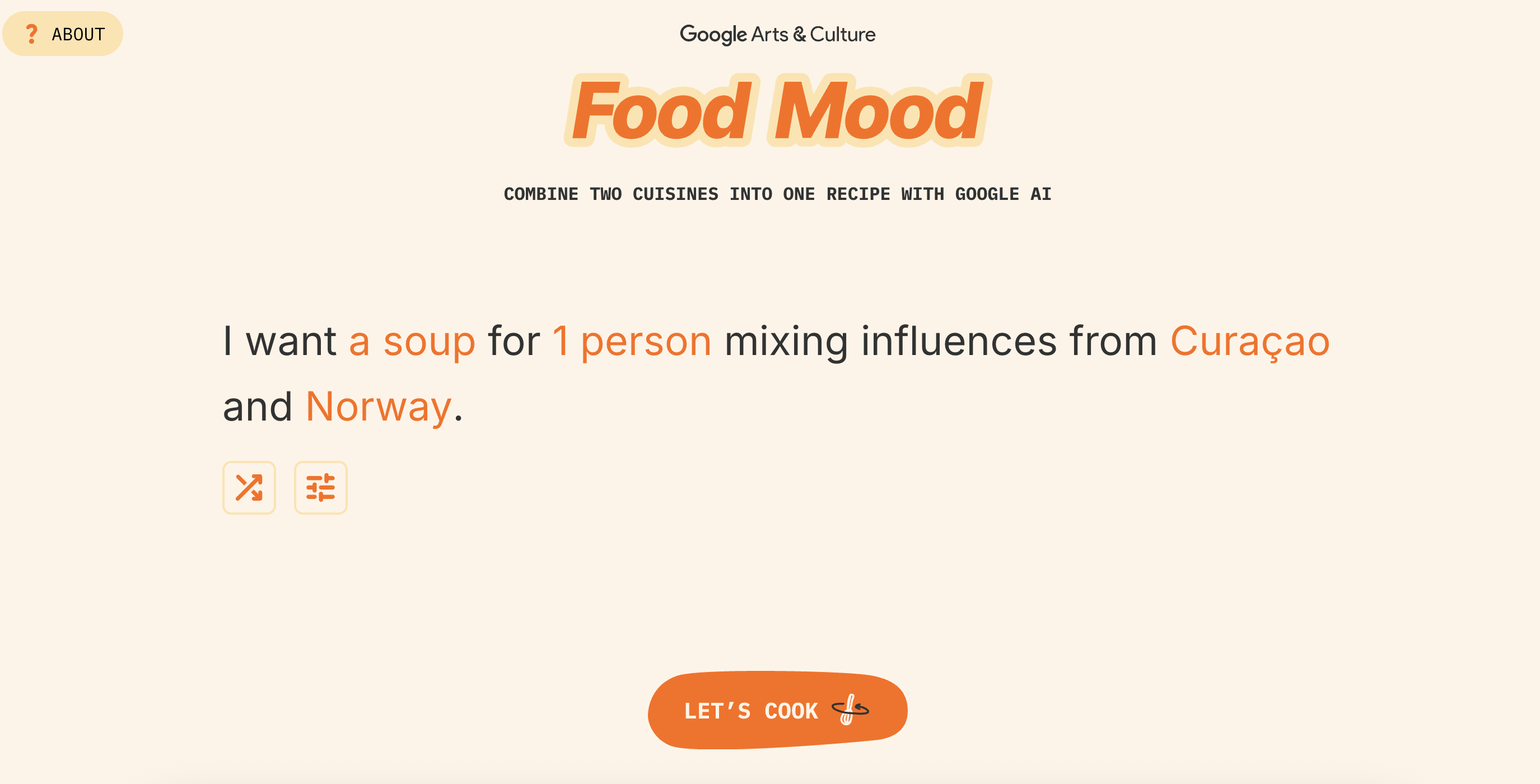 Screenshot from artsandculture.google.com/experiment/food-mood/,September 2025
Screenshot from artsandculture.google.com/experiment/food-mood/,September 2025Food Mood is less about finding the perfect “chicken pasta” recipe and more about encouraging users to experiment. For food publishers and recipe sites, the challenge will be ensuring their content is structured and tagged so it can be effectively integrated into these creative outputs.
Recipe publishers that rely on SEO traffic could see reduced visibility if users embrace AI-generated inspiration instead of searching for specific dish names. On the other hand, sites that invest in structured recipe data, nutritional information, and culinary storytelling may benefit by having their recipes pulled into Food Mood’s suggestions.
This being said, Food Mood is still experimental, and as the result below shows from my testing, it still needs some refinement around ingredient quantities and measurements.
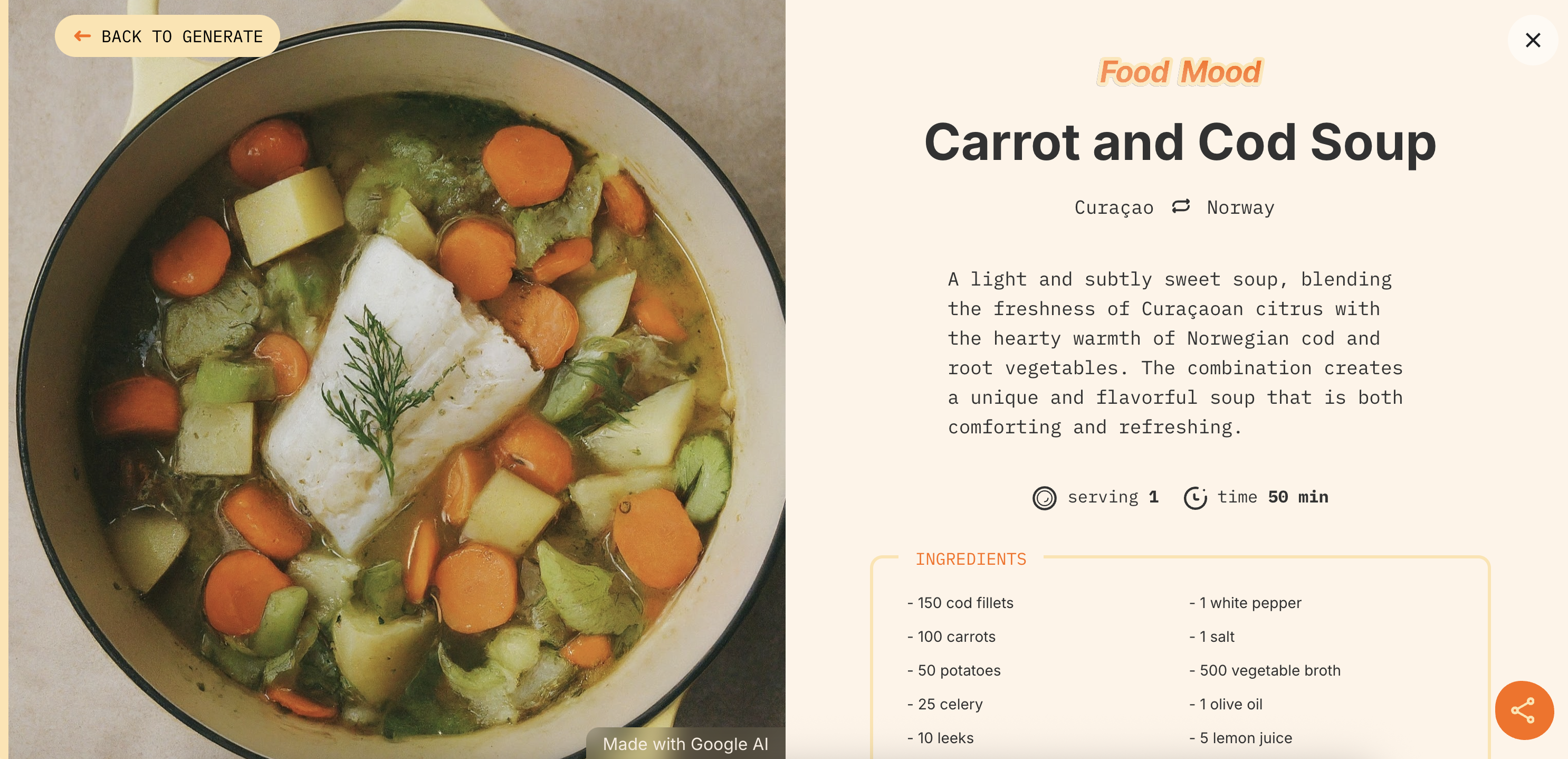 The generative response to make a meal for one, combining the cuisines of Curaçao and Norway… The ingredients list might be off… (Screenshot from Food Mood, September 2025)
The generative response to make a meal for one, combining the cuisines of Curaçao and Norway… The ingredients list might be off… (Screenshot from Food Mood, September 2025)A food blog known for creative plant-based recipes might be highlighted when a user asks Food Mood for “a fun weekend dinner that feels indulgent but healthy.” If the content is tagged and structured correctly, it could be surfaced in ways traditional keyword targeting never allowed.
Food Mood shows how search may evolve toward inspiration-driven discovery. Recipe sites and food brands should prepare by enriching their content with detailed metadata that connects recipes to moods, occasions, and dietary preferences.
Talking Tours
Talking Tours is an active audio experiment from Google Arts & Culture that allows users to tour cultural landmarks in Street View.
Instead of passively looking at images, users can listen to narrated, AI-generated stories about what they are exploring.
This has the potential to change how people engage with cultural and travel content. Rather than relying solely on guidebooks or blog posts, users may interact with AI-driven narratives directly inside Google’s ecosystem. It offers an immersive layer that could shift attention away from traditional content publishers.
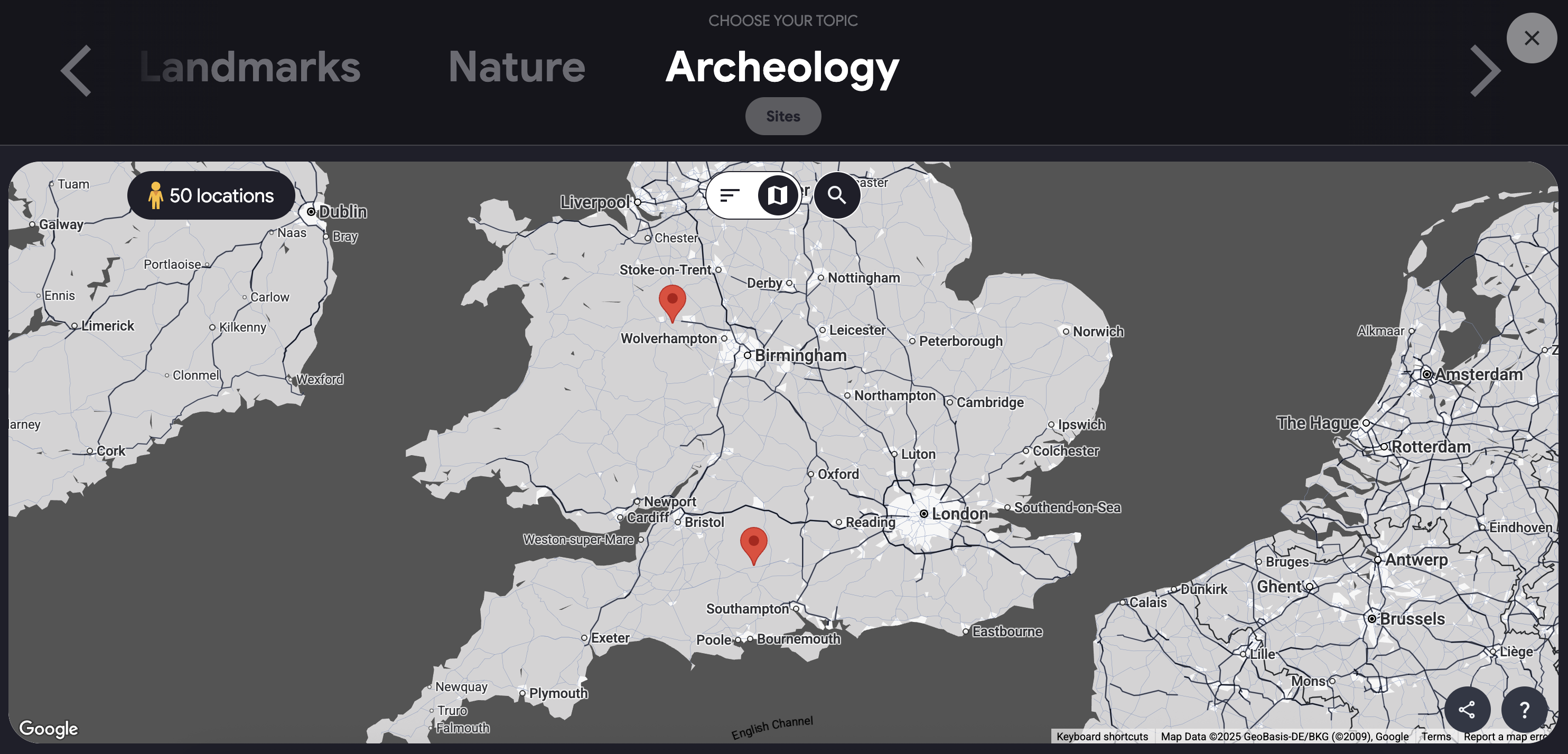 Screenshot from artsandculture.google.com/experiment/talking-tours/, September 2025
Screenshot from artsandculture.google.com/experiment/talking-tours/, September 2025For travel businesses, the opportunity lies in being part of the authoritative content that fuels these AI tours. Travel agencies, tour operators, and cultural organizations that create structured, authentic content may find new visibility if their information is integrated. Without that presence, competitors or third-party providers could dominate the AI-driven storytelling.
A cultural travel company that produces detailed content about European landmarks might benefit from incorporating Talking Tours’ insights during a virtual tour of Rome. Without participation, their competitors may own the conversation.
This also offers would-be travellers the opportunity to explore landmarks and other key locations ahead of travelling, which could influence the comparison and deliberation phases of the decision-making process.
Talking Tours points to a future where immersive, AI-driven experiences shape travel planning. Travel brands should ensure their content is authoritative, structured, and ready to be used in AI-generated narratives.
Learn About
Learn About is an experiment that helps users learn new topics at their own pace using conversational AI. Acting like a digital tutor, it breaks down complex ideas into simple explanations and guides learners to further resources.
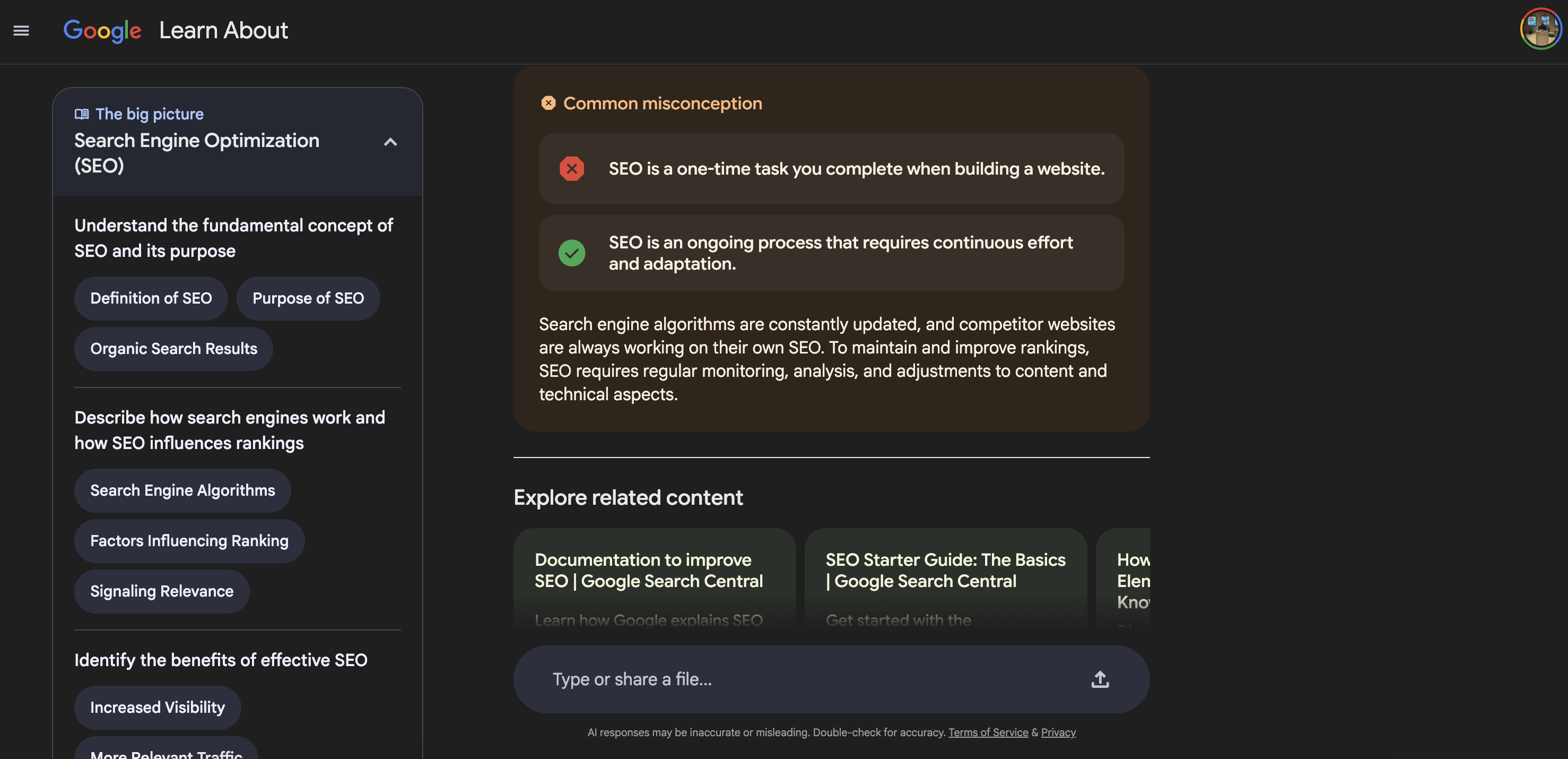 Screenshot from learning.google.com/experiments/learn-about/, September 2025
Screenshot from learning.google.com/experiments/learn-about/, September 2025For education providers, this alters how learners find and engage with content. Instead of searching for “best beginner coding course,” a student might ask Learn About to “explain how websites work” and then follow guided prompts.
Learn About uses various YouTube and web results as sources, and from experimentation, it isn’t afraid to show older content and videos (even those with “for 2023” in the video title) if it believes the content and source are strong enough.
Educational publishers and online learning platforms may experience shifts in traffic if “Learn About” becomes a common entry point. Being cited in AI-driven tutoring sessions could become as valuable as traditional SEO discovery. Institutions that provide well-structured, authoritative, and trustworthy content stand to gain.
A site offering structured beginner-friendly coding lessons might be featured in Learn About when a user begins exploring “how to build a website.” If absent, a competitor may be the one shaping the learner’s first impression of the topic.
Learn About underscores the need for clear, structured, and authoritative educational content. Providers should optimize not only for keywords but also for AI-driven educational journeys.
Preparing For AI Experiments In Search
Google’s experimental features like Doppl, Food Mood, Talking Tours, and Learn About reveal how search may evolve from keyword-driven results to AI-guided discovery experiences beyond what we perceive as traditional search.
These experiments may not all become mainstream, but they indicate where search is heading. Businesses that begin preparing now will be better positioned if and when these ideas are rolled out more widely.
Is your organization ready to compete in a world where AI guides the first step of customer discovery?
More Resources:
Featured Image: insta_photos/Shutterstock

